The joy of pet ownership often comes with one significant drawback: dog hair. For many prospective dog owners, especially those with allergies or a desire for a cleaner home, finding a canine companion that doesn’t leave a trail of fur is a top priority. The good news is that numerous charming and loving small dog breeds which don’t shed exist, offering all the companionship without the constant cleanup. This comprehensive guide explores some of the best small, low-shedding, and non-shedding dog breeds, helping you discover your perfect fur-free friend. Whether you’re seeking a quiet companion or a playful pup, these breeds prove that great things (and minimal shedding) come in small packages. For a more extensive look at various options, explore our comprehensive list of small dogs that don’t shed.
Affenpinscher
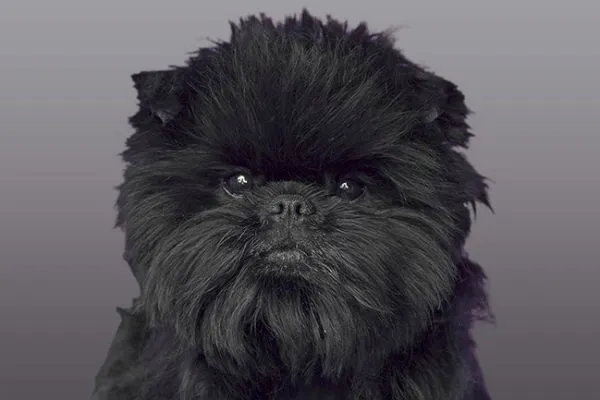 Affenpinscher dog with wiry black coatMeaning “monkey-like terrier,” the Affenpinscher lives up to its name with an intelligent and mischievous expression. Despite their small stature, these Toy group members are fearless and make excellent, watchful companions. A key advantage for owners is the Affenpinscher’s wiry coat, which sheds very little and has almost no “doggy” odor. Routine grooming involves twice-weekly brushing with a slicker brush and comb to keep their shaggy yet neat appearance. This low-maintenance little canine is also celebrated for its big personality and sense of humor, making them a delightful addition to many homes.
Affenpinscher dog with wiry black coatMeaning “monkey-like terrier,” the Affenpinscher lives up to its name with an intelligent and mischievous expression. Despite their small stature, these Toy group members are fearless and make excellent, watchful companions. A key advantage for owners is the Affenpinscher’s wiry coat, which sheds very little and has almost no “doggy” odor. Routine grooming involves twice-weekly brushing with a slicker brush and comb to keep their shaggy yet neat appearance. This low-maintenance little canine is also celebrated for its big personality and sense of humor, making them a delightful addition to many homes.
Basenji
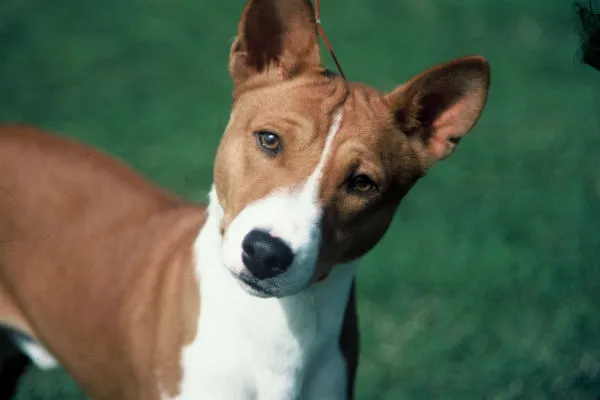 Basenji dog with short brown and white coatFor those who admire hounds but prefer to avoid their characteristic odor and shedding habits, the Basenji offers an intriguing alternative. This breed sheds minimally, and its short, fine coat requires little more than occasional brushing to stay in prime condition. Basenjis are also famously known as “barkless dogs,” emitting unique yodel-like sounds instead of traditional barks, which makes them an ideal choice for apartment living. However, their active and intelligent nature means they thrive with daily exercise and engaging playtime to keep them mentally and physically stimulated. Their unique qualities make them stand out among small quiet dog breeds that don’t shed.
Basenji dog with short brown and white coatFor those who admire hounds but prefer to avoid their characteristic odor and shedding habits, the Basenji offers an intriguing alternative. This breed sheds minimally, and its short, fine coat requires little more than occasional brushing to stay in prime condition. Basenjis are also famously known as “barkless dogs,” emitting unique yodel-like sounds instead of traditional barks, which makes them an ideal choice for apartment living. However, their active and intelligent nature means they thrive with daily exercise and engaging playtime to keep them mentally and physically stimulated. Their unique qualities make them stand out among small quiet dog breeds that don’t shed.
Bichon Frise
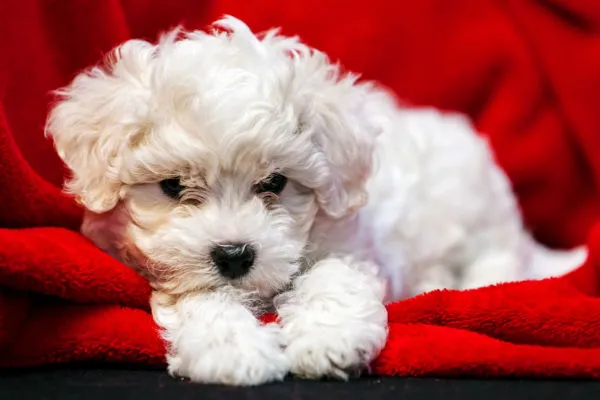 Bichon Frise dog with fluffy white coatThe Bichon Frise is truly a non-shedding small dog breed, making them a top contender for individuals and families concerned about allergies. These playful and affectionate dogs possess a cheerful disposition that brightens any home. While they don’t shed, their distinctive powder-puff coat grows continuously and demands significant grooming attention. Frequent brushing, regular professional grooming appointments, and occasional baths are essential to prevent mats and maintain their iconic fluffy appearance. Despite the grooming commitment, their charming personality and hypoallergenic qualities make them incredibly popular.
Bichon Frise dog with fluffy white coatThe Bichon Frise is truly a non-shedding small dog breed, making them a top contender for individuals and families concerned about allergies. These playful and affectionate dogs possess a cheerful disposition that brightens any home. While they don’t shed, their distinctive powder-puff coat grows continuously and demands significant grooming attention. Frequent brushing, regular professional grooming appointments, and occasional baths are essential to prevent mats and maintain their iconic fluffy appearance. Despite the grooming commitment, their charming personality and hypoallergenic qualities make them incredibly popular.
Bolognese
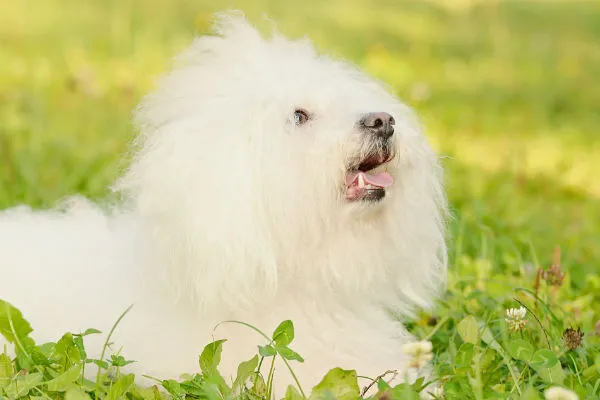 Bolognese dog with fluffy white coat sitting on grassSimilar to the Bichon Frise, the Bolognese boasts a unique fluffy coat composed of hair rather than fur. This means the Bolognese does not shed, offering a fur-free environment for their owners. However, their coat does require diligent care, including daily brushing to remove dead hair and prevent tangles, ensuring these lovable lap dogs always look their best. Known for their calm and devoted nature, Bolognese dogs form strong bonds with their families and are generally content with moderate exercise, making them excellent companions for a quieter lifestyle.
Bolognese dog with fluffy white coat sitting on grassSimilar to the Bichon Frise, the Bolognese boasts a unique fluffy coat composed of hair rather than fur. This means the Bolognese does not shed, offering a fur-free environment for their owners. However, their coat does require diligent care, including daily brushing to remove dead hair and prevent tangles, ensuring these lovable lap dogs always look their best. Known for their calm and devoted nature, Bolognese dogs form strong bonds with their families and are generally content with moderate exercise, making them excellent companions for a quieter lifestyle.
Brussels Griffon
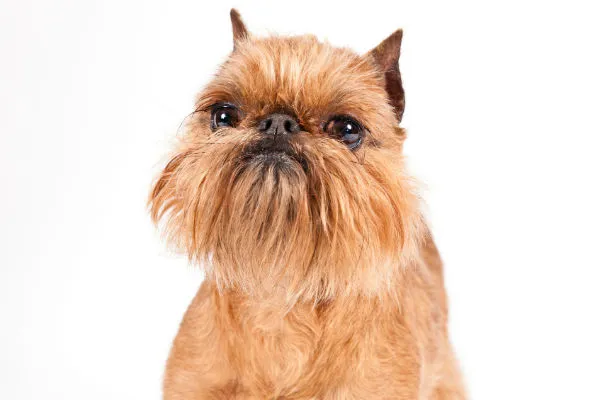 Brussels Griffon dog with wiry brown coatDespite their compact size, the Brussels Griffon is a resilient and robust dog that thrives on interaction rather than pampering. They come in both smooth-coated and rough-coated varieties, both of which are minimal shedders and benefit from regular grooming. The rough-coated Griffons require hand-stripping to maintain their texture and reduce shedding further. Their small size means a daily walk and indoor play usually suffice for their exercise needs, making them adaptable to various living situations. These loyal and sensitive dogs do best with families who can provide consistent companionship and affection.
Brussels Griffon dog with wiry brown coatDespite their compact size, the Brussels Griffon is a resilient and robust dog that thrives on interaction rather than pampering. They come in both smooth-coated and rough-coated varieties, both of which are minimal shedders and benefit from regular grooming. The rough-coated Griffons require hand-stripping to maintain their texture and reduce shedding further. Their small size means a daily walk and indoor play usually suffice for their exercise needs, making them adaptable to various living situations. These loyal and sensitive dogs do best with families who can provide consistent companionship and affection.
Chinese Crested
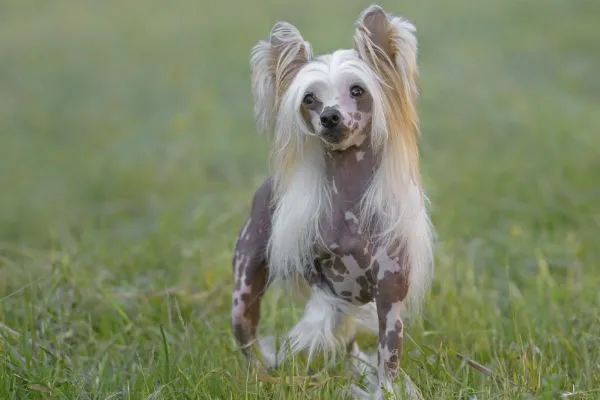 Hairless Chinese Crested dog with tufts of hair on head, tail, and pawsFor those seeking to avoid shedding entirely, hairless dog breeds like the Chinese Crested offer a unique solution. This breed comes in two distinct coat types: the Hairless and the Powderpuff. The Hairless variety features smooth skin with tufts of hair only on their head, tail, and feet, while the Powderpuff is covered in a soft, fine coat that sheds very minimally. Hairless dogs require specialized skin care, including protection from sun exposure and cold temperatures, and are more prone to skin irritations. Both varieties are affectionate, playful, and thrive on human companionship, making them charming and distinctive pets. For individuals considering small short haired dogs that don’t shed, the Powderpuff offers an intriguing alternative.
Hairless Chinese Crested dog with tufts of hair on head, tail, and pawsFor those seeking to avoid shedding entirely, hairless dog breeds like the Chinese Crested offer a unique solution. This breed comes in two distinct coat types: the Hairless and the Powderpuff. The Hairless variety features smooth skin with tufts of hair only on their head, tail, and feet, while the Powderpuff is covered in a soft, fine coat that sheds very minimally. Hairless dogs require specialized skin care, including protection from sun exposure and cold temperatures, and are more prone to skin irritations. Both varieties are affectionate, playful, and thrive on human companionship, making them charming and distinctive pets. For individuals considering small short haired dogs that don’t shed, the Powderpuff offers an intriguing alternative.
Coton De Tulear
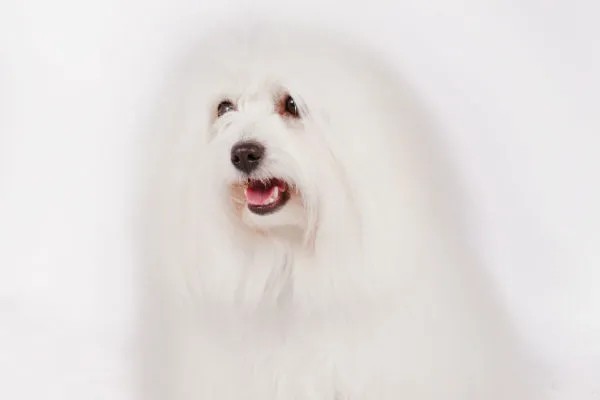 Coton de Tulear dog with long fluffy white coatThe Coton de Tulear is celebrated for its distinctive, long, fluffy coat, which is often described as feeling like cotton. This beautiful coat is considered hypoallergenic, making the Coton de Tulear an excellent choice for allergy sufferers and anyone desiring a small dog that doesn’t shed. While they are low-shedding, their unique coat requires consistent daily grooming to prevent matting and keep it pristine. Known for their lighthearted, intelligent, and gentle natures, Cotons are highly adaptable and devoted companions who readily charm everyone they meet, making the grooming effort truly worthwhile. Their gentle demeanor and minimal shedding make them a fantastic option among small hypoallergenic dog breeds that don’t shed.
Coton de Tulear dog with long fluffy white coatThe Coton de Tulear is celebrated for its distinctive, long, fluffy coat, which is often described as feeling like cotton. This beautiful coat is considered hypoallergenic, making the Coton de Tulear an excellent choice for allergy sufferers and anyone desiring a small dog that doesn’t shed. While they are low-shedding, their unique coat requires consistent daily grooming to prevent matting and keep it pristine. Known for their lighthearted, intelligent, and gentle natures, Cotons are highly adaptable and devoted companions who readily charm everyone they meet, making the grooming effort truly worthwhile. Their gentle demeanor and minimal shedding make them a fantastic option among small hypoallergenic dog breeds that don’t shed.
Havanese
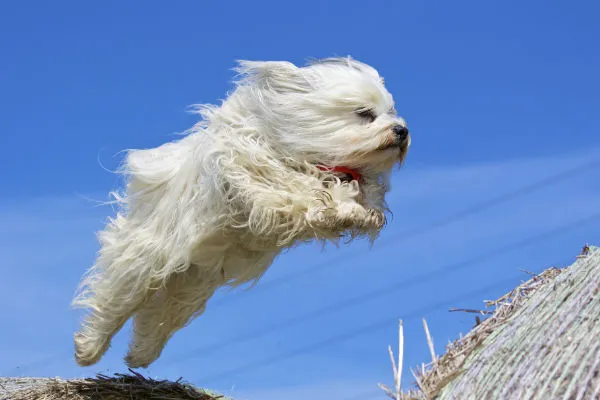 Havanese dog with long wavy brown and white coatNative to Cuba, the Havanese offers owners a delightful combination of patented spunky charm and a coat that doesn’t shed. This means less time spent battling pet hair on furniture and clothing, and more precious moments romping with your playful companion. Their luxurious double coat, though non-shedding, requires commitment to weekly brushing and regular baths to keep it clean, healthy, and free of tangles. Havanese are highly intelligent, easily trained, and possess a naturally outgoing and affectionate personality, thriving on being part of family activities.
Havanese dog with long wavy brown and white coatNative to Cuba, the Havanese offers owners a delightful combination of patented spunky charm and a coat that doesn’t shed. This means less time spent battling pet hair on furniture and clothing, and more precious moments romping with your playful companion. Their luxurious double coat, though non-shedding, requires commitment to weekly brushing and regular baths to keep it clean, healthy, and free of tangles. Havanese are highly intelligent, easily trained, and possess a naturally outgoing and affectionate personality, thriving on being part of family activities.
Maltese
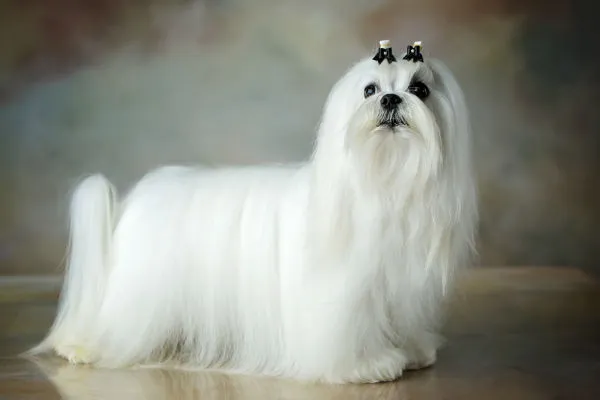 Maltese dog with long white silky coatMaltese dogs have captivated human hearts for an astonishing three millennia. This ancient breed from Malta has maintained its elegant appearance and gentle temperament over centuries, partly due to its highly desirable long, white coat that sheds very little. This makes them an ideal lap dog, adored for their beauty and affectionate nature. While low-shedding, their silky coat demands regular care, including daily brushing to prevent mats and an occasional bath to remove dirt and maintain its pristine look. Maltese dogs are typically gentle, playful, and fearless, thriving on close companionship.
Maltese dog with long white silky coatMaltese dogs have captivated human hearts for an astonishing three millennia. This ancient breed from Malta has maintained its elegant appearance and gentle temperament over centuries, partly due to its highly desirable long, white coat that sheds very little. This makes them an ideal lap dog, adored for their beauty and affectionate nature. While low-shedding, their silky coat demands regular care, including daily brushing to prevent mats and an occasional bath to remove dirt and maintain its pristine look. Maltese dogs are typically gentle, playful, and fearless, thriving on close companionship.
Lhasa Apso
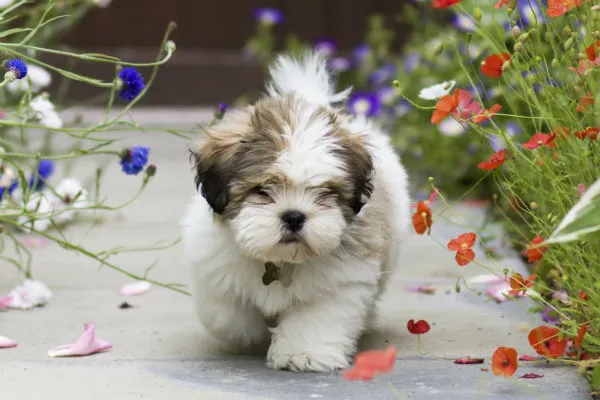 Lhasa Apso dog with long flowing brown coatHailing from the high altitudes of Tibet, the Lhasa Apso is a small but sturdy breed that makes an excellent companion. Possessing a calm yet playful disposition, they enjoy brisk walks and are equally content resting in their owner’s lap. Lhasa Apsos do not shed, but their magnificent long, flowing coats require dedicated maintenance. Many owners opt for a shorter “puppy cut” to simplify daily grooming and brushing, making their care more manageable while still highlighting their charming features and confident stride. This breed is known for its longevity and makes a loyal, watchful family member.
Lhasa Apso dog with long flowing brown coatHailing from the high altitudes of Tibet, the Lhasa Apso is a small but sturdy breed that makes an excellent companion. Possessing a calm yet playful disposition, they enjoy brisk walks and are equally content resting in their owner’s lap. Lhasa Apsos do not shed, but their magnificent long, flowing coats require dedicated maintenance. Many owners opt for a shorter “puppy cut” to simplify daily grooming and brushing, making their care more manageable while still highlighting their charming features and confident stride. This breed is known for its longevity and makes a loyal, watchful family member.
Miniature Schnauzer
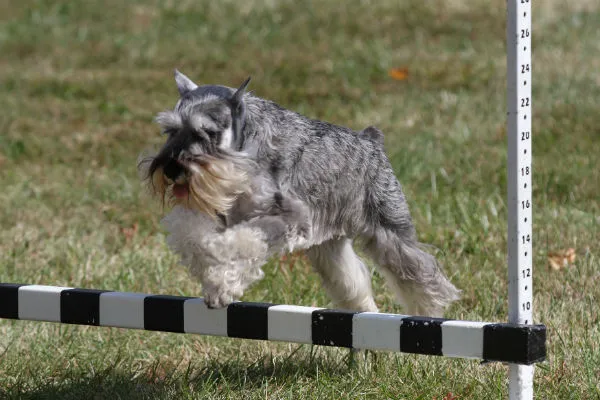 Miniature Schnauzer dog with wiry grey and white coatThe Miniature Schnauzer is a smart, highly trainable, and cheerful little dog, embodying the best traits of its Standard Schnauzer cousin in a compact package. As a Terrier, this breed sheds very little, making it a good choice for those sensitive to pet hair. Their robust and adaptable nature allows them to feel at home whether in a bustling city apartment or a sprawling country estate, as long as they are close to their human companions. To maintain their distinctive appearance and wiry coat, weekly brushing and regular professional grooming, including stripping or clipping, are essential. Miniature Schnauzers are known for their alert nature, making them excellent watchdogs.
Miniature Schnauzer dog with wiry grey and white coatThe Miniature Schnauzer is a smart, highly trainable, and cheerful little dog, embodying the best traits of its Standard Schnauzer cousin in a compact package. As a Terrier, this breed sheds very little, making it a good choice for those sensitive to pet hair. Their robust and adaptable nature allows them to feel at home whether in a bustling city apartment or a sprawling country estate, as long as they are close to their human companions. To maintain their distinctive appearance and wiry coat, weekly brushing and regular professional grooming, including stripping or clipping, are essential. Miniature Schnauzers are known for their alert nature, making them excellent watchdogs.
Poodle
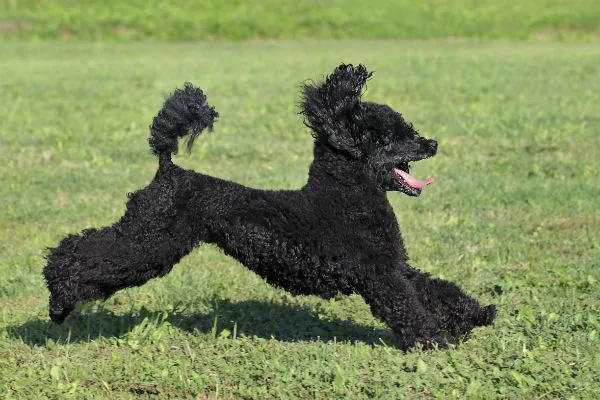 Poodle dog with curly white coatPoodles are perhaps the most widely recognized breed when discussing small dogs that don’t shed, and for good reason. All Poodle varieties—Standard, Miniature, and Toy—are non-shedding and hypoallergenic, differing primarily in size. Miniature and Toy Poodles offer these desirable qualities in intelligent, petite packages. Poodles are renowned for their exceptional intelligence, making them highly trainable and eager to please. They are active, proud, and require consistent mental and physical stimulation. Their signature curly coat, while non-shedding, demands regular and thorough professional grooming to prevent matting and maintain their elegant appearance.
Poodle dog with curly white coatPoodles are perhaps the most widely recognized breed when discussing small dogs that don’t shed, and for good reason. All Poodle varieties—Standard, Miniature, and Toy—are non-shedding and hypoallergenic, differing primarily in size. Miniature and Toy Poodles offer these desirable qualities in intelligent, petite packages. Poodles are renowned for their exceptional intelligence, making them highly trainable and eager to please. They are active, proud, and require consistent mental and physical stimulation. Their signature curly coat, while non-shedding, demands regular and thorough professional grooming to prevent matting and maintain their elegant appearance.
Scottish Terrier
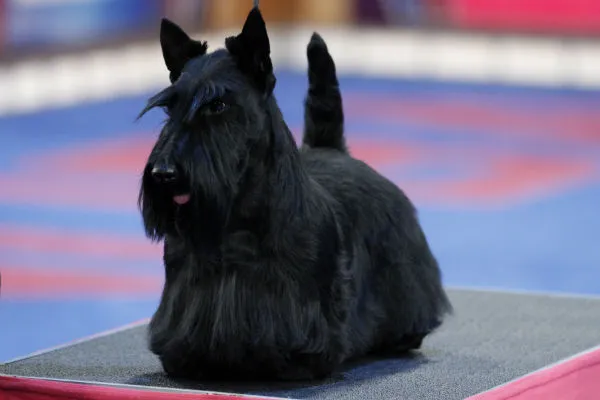 Scottish Terrier dog with wiry black coatThe Scottish Terrier, affectionately known as a “Scottie,” is a Terrier breed celebrated for its unmistakable silhouette, boldness, confidence, and formidable personality. Their wiry, weather-resistant double coat sheds very little, offering a low-maintenance option for many. However, they do require regular brushing, professional grooming, and occasional hand-stripping to keep their coats healthy and maintain the breed’s distinct outline. Scotties are clever, independent dogs with a strong prey drive, which means owners should be mindful when they are around smaller animals. Their loyal yet somewhat reserved nature makes them cherished companions for those who appreciate their tenacious spirit. For a broad overview of similar breeds, consider exploring the different types of small dogs that don’t shed.
Scottish Terrier dog with wiry black coatThe Scottish Terrier, affectionately known as a “Scottie,” is a Terrier breed celebrated for its unmistakable silhouette, boldness, confidence, and formidable personality. Their wiry, weather-resistant double coat sheds very little, offering a low-maintenance option for many. However, they do require regular brushing, professional grooming, and occasional hand-stripping to keep their coats healthy and maintain the breed’s distinct outline. Scotties are clever, independent dogs with a strong prey drive, which means owners should be mindful when they are around smaller animals. Their loyal yet somewhat reserved nature makes them cherished companions for those who appreciate their tenacious spirit. For a broad overview of similar breeds, consider exploring the different types of small dogs that don’t shed.
Shih Tzu
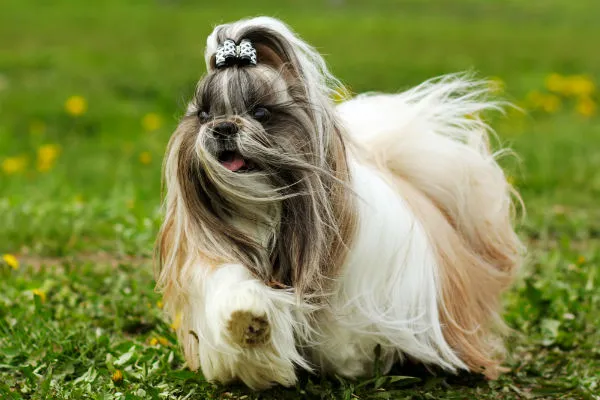 Shih Tzu dog with long flowing brown and white coatThe Shih Tzu boasts an ancient and royal pedigree, having been the favored house pet of the Chinese Tang Dynasty. These “little lion dogs” come in a captivating variety of colors and patterns. Their long, silky hair is very low-shedding and presents a regal appearance when meticulously brushed out, befitting their aristocratic heritage. This Toy breed is surprisingly sturdy and lively, often described as having an arrogant carriage due to their proudly held heads and curling tails. Bred purely for companionship, the Shih Tzu’s gentle, trusting, and outgoing nature makes them exceptional and devoted family members, thriving on close human interaction.
Shih Tzu dog with long flowing brown and white coatThe Shih Tzu boasts an ancient and royal pedigree, having been the favored house pet of the Chinese Tang Dynasty. These “little lion dogs” come in a captivating variety of colors and patterns. Their long, silky hair is very low-shedding and presents a regal appearance when meticulously brushed out, befitting their aristocratic heritage. This Toy breed is surprisingly sturdy and lively, often described as having an arrogant carriage due to their proudly held heads and curling tails. Bred purely for companionship, the Shih Tzu’s gentle, trusting, and outgoing nature makes them exceptional and devoted family members, thriving on close human interaction.
West Highland White Terrier
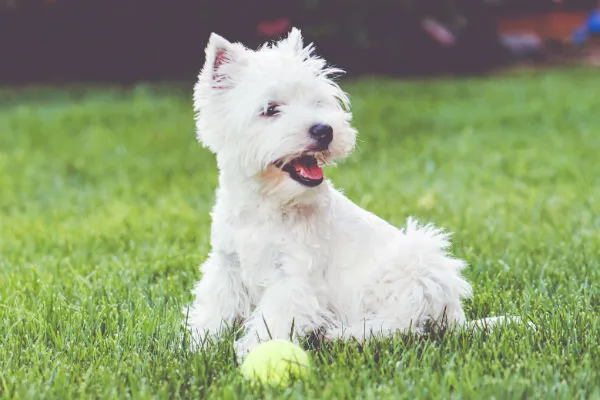 West Highland White Terrier dog with coarse white coatThe coarse, crisp white coat of the West Highland White Terrier, affectionately known as a “Westie,” sheds very little. This sturdy and charming little dog is intelligent, loyal, happy, and incredibly entertaining, making them a popular choice for families. Westies are naturally curious dogs with moderate energy levels, enjoying both playtime and snuggling. However, they possess an independent streak common among all Terriers, which can sometimes present a playful challenge during training. Regular brushing and professional grooming are necessary to keep their iconic coat in top condition.
West Highland White Terrier dog with coarse white coatThe coarse, crisp white coat of the West Highland White Terrier, affectionately known as a “Westie,” sheds very little. This sturdy and charming little dog is intelligent, loyal, happy, and incredibly entertaining, making them a popular choice for families. Westies are naturally curious dogs with moderate energy levels, enjoying both playtime and snuggling. However, they possess an independent streak common among all Terriers, which can sometimes present a playful challenge during training. Regular brushing and professional grooming are necessary to keep their iconic coat in top condition.
Xoloitzcuintli
 Hairless Xoloitzcuintli dog with smooth grey skinAlso known as the Mexican Hairless dog, the Xoloitzcuintli is an ancient and rare breed. Xolos can be either hairless or coated. The hairless varieties typically retain a small amount of hair on their heads, while the coated variety has a very short, fine coat that sheds minimally. As with any hairless breed, the Xolo requires extra attention to their skin, needing protection from harsh sun and cold weather, as well as regular moisturizing. Xolos are known for being attentive watchdogs and deeply affectionate companions. While they enjoy physical activities like walks and vigorous play, they are equally celebrated for their tranquil and calm demeanor within the home.
Hairless Xoloitzcuintli dog with smooth grey skinAlso known as the Mexican Hairless dog, the Xoloitzcuintli is an ancient and rare breed. Xolos can be either hairless or coated. The hairless varieties typically retain a small amount of hair on their heads, while the coated variety has a very short, fine coat that sheds minimally. As with any hairless breed, the Xolo requires extra attention to their skin, needing protection from harsh sun and cold weather, as well as regular moisturizing. Xolos are known for being attentive watchdogs and deeply affectionate companions. While they enjoy physical activities like walks and vigorous play, they are equally celebrated for their tranquil and calm demeanor within the home.
Yorkshire Terrier
 Yorkshire Terrier dog with long silky brown and black coatSprightly, bold, and fiercely affectionate, the Yorkshire Terrier, commonly called a “Yorkie,” is a Toy breed overflowing with personality. These spunky lap dogs consistently rank among the most popular breeds, and for excellent reasons. Yorkshire Terriers do not shed, and their long, silky coats are undeniably beautiful when brushed daily—a task made manageable by their small size. Despite their regal appearance and proud carriage, Yorkies possess working-class roots, originally bred to hunt rats in English clothing mills. Today, they are just as happy to snuggle on their owner’s lap as they are to engage in playful antics. Their fine hair does require regular grooming to prevent tangles and maintain its lustrous quality.
Yorkshire Terrier dog with long silky brown and black coatSprightly, bold, and fiercely affectionate, the Yorkshire Terrier, commonly called a “Yorkie,” is a Toy breed overflowing with personality. These spunky lap dogs consistently rank among the most popular breeds, and for excellent reasons. Yorkshire Terriers do not shed, and their long, silky coats are undeniably beautiful when brushed daily—a task made manageable by their small size. Despite their regal appearance and proud carriage, Yorkies possess working-class roots, originally bred to hunt rats in English clothing mills. Today, they are just as happy to snuggle on their owner’s lap as they are to engage in playful antics. Their fine hair does require regular grooming to prevent tangles and maintain its lustrous quality.
Considerations for Non-Shedding Small Dog Breeds
While selecting a small dog breed that doesn’t shed offers many advantages, it’s important to remember that “non-shedding” doesn’t mean “zero maintenance.” Many of these breeds, particularly those with continuous-growing hair, require regular and often professional grooming to prevent matting, maintain coat health, and ensure their comfort. This can include daily brushing, regular bathing, and trips to the groomer every few weeks.
Beyond grooming, consider other crucial factors like temperament, energy levels, training needs, and potential health issues specific to each breed. Research thoroughly to ensure a breed’s personality and lifestyle requirements align with your own. Always prioritize ethical acquisition by choosing a reputable breeder or adoption agency. Providing a high-quality diet and consistent veterinary checkups are essential for the health and well-being of any dog, shedding or not.
References
- American Kennel Club (AKC). (Various breed pages and articles consulted for breed characteristics, history, and care guidelines).
- Dogtime. (General dog care and breed information).
